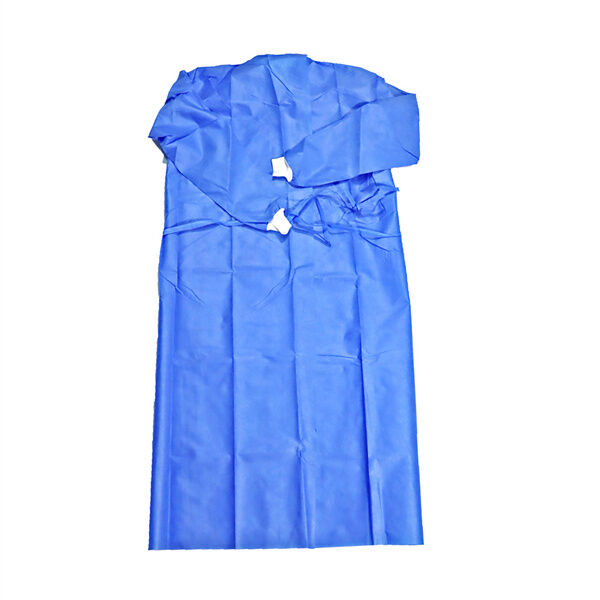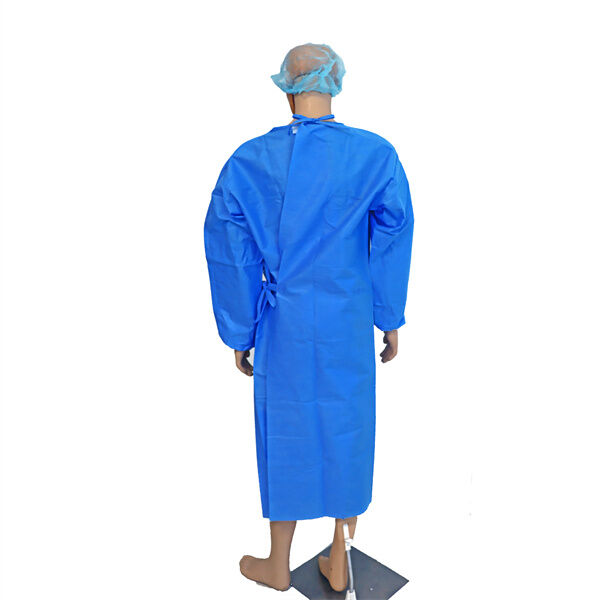Ang mga surgeon gown ay mahalaga para sa mga surgical intervention (surgery), dahil gumaganap ang mga ito ng papel sa pagbabawas ng pagkalat ng impeksyon sa mga pasyente at healthcare worker sa pamamagitan ng pagpigil sa cross-contamination. Operating room gowns - Ang mga ito ay partikular na idinisenyo upang bawasan ang paglipat ng mga pathogenic microorganism tulad ng bacteria at virus, at sa gayon ay ginagawa itong perpekto para maiwasan ang mga operasyon na madungisan ng mga mikrobyo na ito. Maraming iba't ibang paraan ng [mga gown na pipiliin mo] na lahat ay nag-iiba sa kung gaano kabisa ang mga ito at kung anong uri ng pamamaraan ang karaniwang ginagawa sa kanila.
Ang mga medikal na pamamaraan ay maaaring tumakbo mula sa simple hanggang sa kumplikado, at iba-iba sa oras na kinuha; kaya ang isang malawak na pagpipilian ng mga operation gown ay mas mahusay na magsilbi sa parehong proteksyon na may ginhawa para sa pagsusuot sa lahat ng oras. Bagama't ang mga ospital ay nananahi ng mga katulad na gown mula sa mga materyales tulad ng Tyvek, isang non-woven na plastik na ginagamit sa pagbuo ng insulation bukod sa iba pang mga application, ang mga disposable isolation gown ay puti at pinoprotektahan hindi lamang ang mga surgical na pasyente kundi ang mga medical staff. Ang mga reusable na gown, sa kabilang banda, ay ginawa gamit ang mas mabibigat na tela na maaaring tumagal nang lampas sa isang gamit gaya ng kinakailangan para sa mga disposable isolation gown.
Karamihan sa mga surgical gown ay idinisenyo bilang isang malawak na gown, na nararamdaman ng kumpletong coverage at ginawa gamit ang plastic na materyal na nagbibigay ng mahusay na proteksyon sa hadlang o mga contaminant sa malalawak na zone sa tiyan. Bilang kahalili, ang ilan ay ginawa upang maging water-repellant- na ginagawang perpekto ang mga ito para sa pagpapanatiling tuyo ng mga propesyonal sa pangangalagang pangkalusugan habang nasa trabaho. Ang mga kulay cream na gown, ayon sa ipinag-uutos ng mga regulasyong Pederal na binanggit sa inilarawang pormal na pagsusuri sa ospital ng mga regulator at nakuha sa pamamagitan ng mga kahilingan sa pampublikong talaan - ay ginagamit lamang para sa mga panakip ng damit ng pasyente na nilalayong panatilihin ang mga damit ng mga pasyente mula sa dumi ng baka o mga pananim ng dugo sa panahon ng kurso-of- mga paggamot sa pangangalaga kabilang ang dialysis (ang mga kagamitan sa cogeneration na maaaring mag-overheat ay naninirahan sa sahig na ito. Ang mga ito ay may iba't ibang laki para sa halos lahat ng laki at hugis ng tao. Dental Apron: Proteksiyon na apron na ginagamit upang takpan ang dibdib at kandungan, isinusuot ang mga ito sa panahon ng mga pamamaraan sa ngipin upang hindi masira ang mga damit at samakatuwid ay maiwasan ang kontaminasyon.

Mahalagang ganap na isterilisado ang mga operating gown dahil ang hindi paggawa nito ay magreresulta sa mga impeksyon. Mahalagang palaging sumunod sa mga tagubilin sa isterilisasyon at pagpapanatili ng mga tagagawa. Ang bawat gown ay dapat ding hugasan na parang may kakayahan silang dalhin ang virus (dahil mayroon ito), pagkatapos ay hugasan ng mainit na tubig at sabong panglaba para sa pagdidisimpekta, siniyasat bago hugasan kung sakaling may anumang mga butas o luha bago ang paglalaba na nagpapahintulot sa muling pagdumi.
Mga surgical gown na isterilisado sa Autoclave: Ito ay isang makina na gumagamit ng init na isinasagawa ng singaw (Applied pressure) upang patayin ang masasamang particle, spores at laban sa mataas na temperatura. Pagkatapos, isa-isang ibalot ang mga gown at ilalagay sa isang sterile dry space na walang mga kontaminant. Ang mga resuable na gown ay mayroon lamang buhay ng paggamit at dapat na itapon alinsunod sa mga tagubilin ng tagagawa ayon sa takdang panahon upang itapon at palitan.

Ang mga gown ay mahalaga para maiwasan ang pagkalat ng impeksyon, lalo na sa isang medikal na kapaligiran. Ang surgical site infections (SSI) ay isa sa ilang pinakakaraniwang impeksyong nauugnay sa pangangalagang pangkalusugan sa buong mundo, ayon sa World Health Organization (WHO). Ang mga operating gown ay idinisenyo para sa mga invasive na pamamaraan, upang makatulong na mabawasan ang kontaminasyon ng surgical na sugat at bawasan ang mga HAI partikular na ang mga SSI.
Naaayon sa mga natuklasan, ang iba pang mga hakbang sa pag-iwas sa impeksyon ay ang isterilisasyon ng mga instrumentong pang-opera, mga kasanayan sa kalinisan ng kamay at pagdidisimpekta sa kapaligiran sa ospital. Gayunpaman, ang pagsunod sa mga protocol na ito ay nagbawas ng mga impeksyon na nakuha sa ospital ngunit nakaapekto rin sa kinalabasan ng pasyente.

Ang surgical gown lalo na ay mahalaga para sa healthcare staff sa kanilang surgical settings, dapat nilang malaman at sanayin kung paano gamitin ang mga damit na ito na disposable at pagkatapos ay matutunan din ang tungkol sa pag-aalaga at isterilisasyon. Ang pagkabigong mapanatili ang mga gown ay maaaring humantong sa mas mataas na paghahatid ng impeksyon at karagdagang mga komplikasyon para sa pasyente. Ang tamang surgical gown ay dapat piliin ng mga medikal na kawani at ang antas ng pangangalaga para sa cross contamination prevention ay isang garantiya.
Ngayon, kailangan mo lang tiyakin na isaisip ang mahalagang tungkulin ng mga surgical gown dahil nakakatulong ang mga ito sa pagkontrol ng mga impeksyon sa loob ng iyong ospital. Ang naaangkop na paggamit ng tamang surgical gown para sa bawat pamamaraan at pagsunod sa tamang pag-aalaga at mga proseso ng isterilisasyon ay dalawang kritikal na paraan na hindi lamang nakakatulong na maiwasan ang mga impeksyon sa panahon ng operasyon, ngunit mayroon ding positibong epekto sa mga resulta ng pasyente. Ang mga tagapagbigay ng pangangalagang pangkalusugan ay dapat na hawakan sa pinakamataas na pamantayan ng antiseptiko kapag nagsasagawa ng mga pamamaraang ito, habang tinitiyak muna ang kaligtasan ng pasyente.

Copyright © Suzhou Suning Underpad Co., Ltd. Lahat ng Karapatan ay Nakalaan - Pribadong Patakaran - Blog